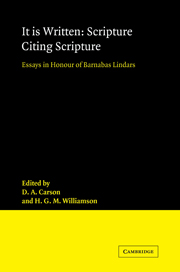Book contents
- Frontmatter
- Contents
- Preface
- Biographical note
- Abbreviations
- 1 An assessment of recent developments
- THE OLD TESTAMENT IN THE OLD TESTAMENT
- BETWEEN THE TESTAMENTS
- THE OLD TESTAMENT IN THE NEW TESTAMENT
- 11 Text form
- 12 Matthew
- 13 Mark
- 14 Luke/Acts
- 15 John and the Johannine Epistles
- 16 The Pauline literature
- 17 Hebrews
- 18 James, 1 and 2 Peter, Jude
- 19 Revelation
- Indexes
16 - The Pauline literature
Published online by Cambridge University Press: 16 January 2010
- Frontmatter
- Contents
- Preface
- Biographical note
- Abbreviations
- 1 An assessment of recent developments
- THE OLD TESTAMENT IN THE OLD TESTAMENT
- BETWEEN THE TESTAMENTS
- THE OLD TESTAMENT IN THE NEW TESTAMENT
- 11 Text form
- 12 Matthew
- 13 Mark
- 14 Luke/Acts
- 15 John and the Johannine Epistles
- 16 The Pauline literature
- 17 Hebrews
- 18 James, 1 and 2 Peter, Jude
- 19 Revelation
- Indexes
Summary
PRELIMINARY CONSIDERATIONS
The question of the use of the Old Testament in the Pauline literature is broader than that of Paul's use of the Old Testament, for when we inquire about the Pauline literature we have all thirteen letters of the traditional Pauline corpus (Hebrews excepted) in view. As is well known, only seven of these are uncontested in modern criticism (Romans, 1 and 2 Corinthians, Galatians, Philippians, 1 Thessalonians, and Philemon). The significance of the distinction between the Pauline literature and Paul himself is, however, considerably lessened by the fact that the explicit Old Testament quotations are not spread evenly through the Pauline corpus, but appear mainly in the Hauptbriefe, whose authenticity no one questions. Such quotations are missing from Philippians, Colossians, 1 and 2 Thessalonians, Titus and Philemon. Explicit quotations are, however, found in Ephesians and 1 and 2 Timothy. For purposes of convenience, I shall speak of Paul's use of the OT when referring to the entire Pauline corpus, but in most cases it will be clear I am referring to Paul himself.
Our attention will be directed primarily to Paul's explicit quotation of the OT, and hence largely to Romans, the Corinthian letters, and Galatians. Before proceeding further, we must give attention, however briefly, to two matters of definition: (1) What is meant by explicit quotation? (2) What OT are we talking about?
(1) Explicit quotations in Paul are almost always easily identified. Rarely do we find an OT quotation which is not introduced by an introductory formula or some sign that clearly identifies it as such.
- Type
- Chapter
- Information
- It Is Written: Scripture Citing ScriptureEssays in Honour of Barnabas Lindars, SSF, pp. 265 - 291Publisher: Cambridge University PressPrint publication year: 1988
- 2
- Cited by



